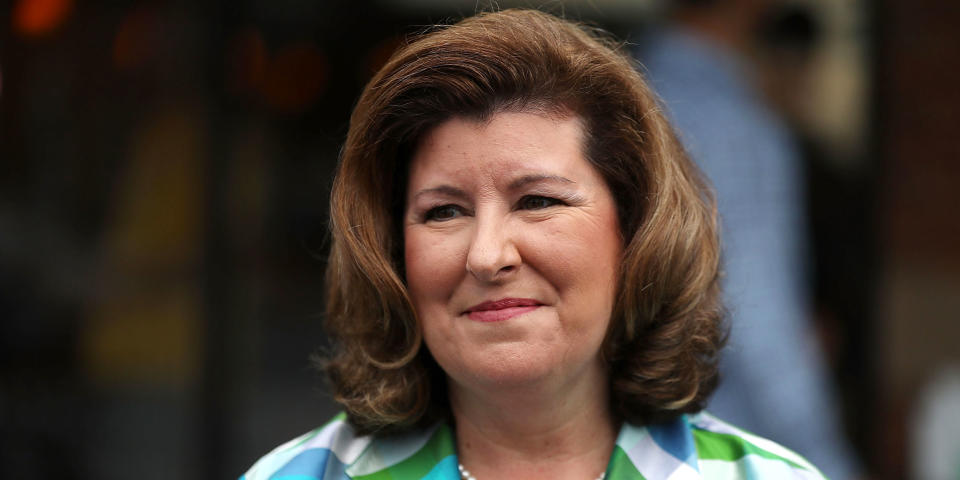Karen Handel's Positions on Women's Rights


When Karen Handel won the special election to fill the House seat vacated by Health and Human Services Secretary Tom Price, she became the first Republican woman to be elected to Congress in Georgia. It's a historic moment for women, complicated by the fact that, in her long career in public life, Handel has taken several stances that threaten women's rights.
Handel is perhaps most known for what happened during her stint as an executive at Susan G. Komen for the Cure. In 2012, the breast cancer research foundation cut its grant funding to Planned Parenthood, which relied on that money to perform breast cancer screenings. The move caused an uproar among Komen supporters and was largely viewed as a public relations disaster. Handel, then the senior vice president of public policy at Komen, faced much of the blame and resigned after the foundation quickly reversed its decision.
Handel later tried to shift some of the responsibility. "I clearly acknowledge that I was involved in the process," she said, "but to suggest that I had the sole authority is just absurd." After Handel left Susan G. Komen, the animus was so great that she wrote a book about her experience and titled it Planned Bullyhood, telling The Daily Beast that Planned Parenthood's handling of the crisis was "bullying at the height of bullyism." (In her book, Handel credits her old boss Marilyn Quayle, former Vice President Dan Quayle's wife, for making her think about what it means to be pro-life. "Marilyn is staunchly pro-life," she writes, "and her views on family made a particular impression on me.")
Though Handel, a devout Catholic, denied that the decision had to do with "political beliefs or ideology," Planned Parenthood has been part of Handel's politics since she was on the Fulton County board of commissioners in the early 2000s and voted to grant $400,000 to Planned Parenthood. When she ran unsuccessfully for governor of Georgia in 2010, she was criticized for that vote and accused by her opponent for not being conservative enough. By the time she was running for governor, Handel included cutting state aid to Planned Parenthood in her gubernatorial platform. At that time, though, she still thought abortion should be legal in cases of rape, incest, or threat to a mother's life. In 2017, Handel listed abortion as one of eight major issues on her campaign website, stating that she believes "life begins at conception."
One of Handel's talking points in defense of her record is that she has spent her whole career fighting for women's health. Handel's campaign put out a statement saying that "Karen has fought for women and women's health issues for virtually her entire career," though most of the cited examples had to do with her breast cancer advocacy. More broadly on issues of health care, Handel does not support the Affordable Care Act, for economic reasons; she has said that she and her husband are on the health care exchange and that their premiums are too high. She also has said that she felt misled by claims that abortions would not be covered under the ACA - while no federal funds pay for abortion services, if a state doesn't bar abortion coverage, a private insurer can offer plans that include abortion coverage on the health care exchanges. She has stated that while the American Health Care Act passed by the House is "not perfect," she wants a full repeal and replacement of the ACA. The Congressional Budget Office found that the AHCA would leave 24 million Americans without health care.
Religious beliefs also motivate Handel's cavalier attitude toward the LGBTQ community. "Marriage is between one man and one woman, and I've been very, very clear about that," she said in an interview in 2010. When asked to elaborate why she believed that to be true, she laughed in disbelief. "Why is marriage between one man and one woman? Are you serious?" She voted against domestic partner benefits when she was on the Fulton County board of commissioners. She is against gay adoption and said in 2010 that she would consider outlawing such practices.
By 2017, Handel's delivery, though not her stance, had softened somewhat. A woman whose daughter is a lesbian asked Handel about what same-sex protections she might expect Handel to defend in Congress. Handel said, "My faith calls me to a different place on the issue." As assurance to the constituent, Handel said that "the issue's been decided by the U.S. Supreme Court," but then again, the same is true of abortion.
One issue that might not seem particularly specific to women - but is of significant economic importance - is that of a higher minimum wage, which came up in a debate in June. Handel stated bluntly, "I do not support a livable wage." She had the same position when she was running for Senate in 2014: "Increasing minimum wage doesn't build a stronger economy," she said. "Creating more and better jobs is how you build a strong economy."
But the minimum wage disproportionately affects adult women, who make up early two-thirds of minimum wage workers, according to the National Women's Law Center. The federal minimum wage is $7.25 an hour, which hasn't changed since 2009, and it leaves minimum-wage earners below the poverty line (Georgia's minimum wage is $5.15). Many states have higher minimum wages and this helps to minimize the gender pay gap, according to a study by the NWLC. The pay gap doesn't exist, though, according to Handel, who said in 2014, "I've been in the corporate world for virtually my entire career and I've never had any disparity like that."
So that's some of what is known about where Handel stands on women's issues. It's not an encouraging sign for how she'll vote after she's sworn into Congress.
You Might Also Like

